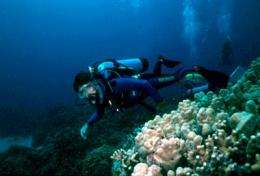Scientists call on US to stem ecological impact of trade in coral reef wildlife

International law has failed to protect coral reefs and tropical fish from being decimated by a growing collectors market, but U.S. reforms can lead the way towards making the trade more responsible, ecologically sustainable and humane.
That's the view of 18 experts, including Washington State University marine ecologist Brian Tissot, writing in the journal Marine Policy.
"Our actions have a big impact on what happens in these coral reef ecosystems, which are already hit hard by other forces like global warming, ocean acidification and overfishing," said Tissot, lead author and professor of Earth and Environmental Sciences at WSU Vancouver.
Using data from the United Nation's conservation monitoring program, the authors say trade in coral and coral reef species is substantial and growing, removing 30 million fish and 1.5 million live stony corals a year. The aquarium industry alone targets some 1,500 species of reef fishes. Many die in transit, leading collectors to gather even more animals to compensate for their losses.
The result is some species have gone "virtually extinct," said Tissot. The Banggai cardinalfish, which is unique to a remote Indonesian archipelago, has had its numbers reduced and even eliminated through much of its range after it became a popular aquarium fish in the late 1990s.
The Marine Policy paper grows out of a meeting of more than 40 scientists, NGOs and policy experts during the 2009 International Marine Conservation Congress. Their concerns grew even more pressing after the Convention on International Trade in Endangered Species, or CITES, did not take action on key groups of corals this March. Authors include experts from the U.S. Agency for International Development, the National Marine Fisheries Service, Humane Society International, the Pew Environment Group and the Environmental Defense Fund.
With U.S. buyers accounting for more than half the trade in live coral, reef fish and invertebrates, the authors recommend leveraging U.S. market power to reduce the trade's environmental effects. They suggest laws to protect a wider variety of species, better enforcement that includes tracking a product's chain of custody, and reforms in source countries. They also recommend changes in marketing to promote sales of species certified as being humane and sustainable.
"The U.S.," say the authors, "should assume its role as an international leader in coral reef conservation and take steps to reform the international trade it drives."
Provided by Washington State University
















